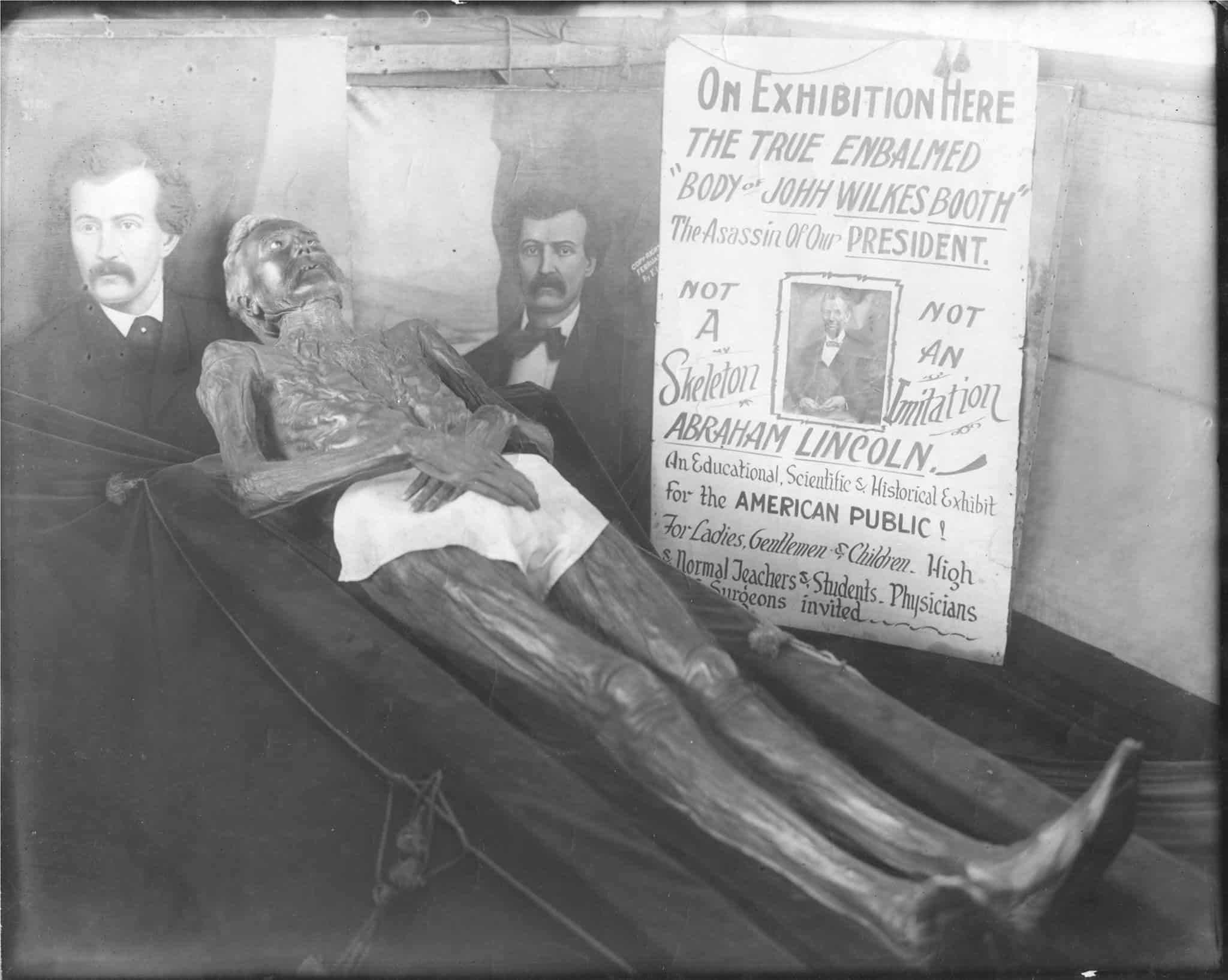
07 Aug THE STRANGE STORY OF DAVID GEORGE (OR IS IT JOHN WILKES BOOTH)
THE STRANGE STORY OF DAVID GEORGE (OR IS IT JOHN WILKES BOOTH)
January 13, 1903
Enid, Oklahoma
The old man looked sat in his chair sipping whiskey. The narrow room with the unusually high ceilings would be his last stop. The Grand Avenue Hotel in which the room was, in which he sat sipping whiskey, would be his last address. He looked out the window, down onto to Grand Avenue, where ladies in their stoles and gentlemen in their overcoats strolled, covering themselves from the bite of the mid-January chill.
What was it that he was thinking about? Did he recite Shakespeare, which had been his custom to do after a few drinks in the bar downstairs? Did he reflect on his life? Did he have regret? Sorrow? Or, had he found pride as he neared the end?
He took another slow sip from the tumbler. He let the sweet bourbon roll over his lounge until it began to sting of alcohol, and fall down his throat. Familiar. Placing the tumbler back on the brass tray, he reached for the small vile and brought it in front of him. He removed the cork, placed the edge of the glassware to his mouth, and in one smooth motion threw his head back, opened his mouth and allowed gravity to work its magic. “Sic Semper Tyranus”, he whispered.
The cyanide solution worked quickly and the man wretched and violently convulsed for several minutes, before his lifeforce escaped its dying host only to haunt the narrow room.
The man was a drunkard, house painter that had made his way to Enid by way of Texas. He called himself David E. George, but just a few hours before his death he had claimed another name to the physician that had attended to him. He gripped the physician by his arm and told him that, “I killed the greatest man that ever lived.”
“I am John Wilkes Booth”, he said.
Did John Wilkes Booth die in a tobacco barn in Virginia on April 26, 1865, twelve days after completing one of the dastardliest acts in American History? Or did he commit suicide in his boarding room at the Grand Avenue Hotel in Enid, Oklahoma 38 years later?
The identification of Booth’s corpse has always been disputed, and the size and shape of the conspiracy that led to the assassination of Abraham Lincoln is itself steeped in legend. Many people helped Booth as he evaded capture after completing his final act and leaping to the stage of Ford’s Theatre. It’s plausible that he could have continued his escape and remained on the run. The man who called himself Davis George left behind just enough to make the curious, wonder.
George claimed to be a house painter, but was not good at the job. He spent most of his time drinking and citing lines of Shakespearian prose. He hobbled from a leg that had been broken and healed improperly years before. He had dark curls and a face that couldn’t help, but remind one of the famous assassin.
Prior to moving to Enid, George had gone by the last name of St. Helen. He fled Texas after an illness left him close to death. He told the attending physician on that occasion that he was John Wilkes Booth as well.
After George died his body was taken to Penniman’s Funeral Parlor, where it was embalmed using arsenic. The method of embalming left the corpse in a very life-like state of preservation. The body remained at the parlor unclaimed for number of years, and during that time the body was displayed in the storefront window, fully dressed, in a rocking chair, with a newspaper laid across its lap.
It was a lawyer from Tennessee that would purchase the mummified remains, where he kept it in a barn for the next 20 years as he attempted to claim the reward offered by the government for Booth.
The corpse was again purchased and displayed at different fairs and carnivals, including the St. Louis World Expo. Barkers would claim the remains to be that of John Wilkes Booth and for a shiny nickel the patron could step behind a curtain and lay eyes on his mummified remains. In a twist, as strange as the story behind the corpse itself, one day the body just disappeared.
Did John Wilkes Booth die in a hotel in Enid, Oklahoma? I don’t know. Is it possible? Of course.
The government’s version of what happened to Booth is sketchy. The identification of his remains before they were hastily buried, does lend one to question the accuracy of the account. Booth did have help in the form of a network of powerful people that wanted to see his mission completed, and he was able to give chase from his pursuers, while injured, with the help of others, for twelve days, in what was the largest manhunt in American history. There is also the argument that his capture or death was so important that men in high power would be tempted to exaggerate his demise to satisfy a demanding public crying out for justice.
However, the inverse of all those arguments are also just as plausible, and could conclude that Booth did meet his end on that farm in Virginia. So why would anybody fabricate a story like that on their death bed? Why would anybody do such a thing if it was not true.
Our lives and the lives of everyone we know are stories. Who doesn’t love a good story? I would venture to say that you are still reading this one because of its appeal to fascinate. Is there anything fascinating about a barfly who died alone in a hotel room in Enid, Oklahoma in 1903?
As David George sat in that dark room on the cold January day and watched the people milling about on the street below, and contemplated the oncoming of his own death, what was he thinking?
Could he have been reflecting upon a life without meaning? Just another drunkard, transient, without a legacy, meeting his end. People might not want to live forever, but we don’t want to be forgotten. I wonder if he was imagining the stone that would mark his final resting place and bear nothing more than the name he had been known by, or he could die as something more than he had ever been in life. In death, he could achieve something that maybe he chased his entire life, a story, a meaning. So, he died as Booth, and more than a century later, you are becoming familiar with a guy named David George who died alone in a hotel in Enid, Oklahoma. It’s nice to never be forgotten, to leave something behind.
I’m curious what you think? I know we have some followers that reside in the Enid area, or may have heard this story before. Perhaps one of you has a childhood memory or have been told of a time when one of your relatives paid a nickel to lay eyes on the “real” body of John Wilkes Booth. Please tell me about it. I’d love to hear your thoughts or your story.



No Comments